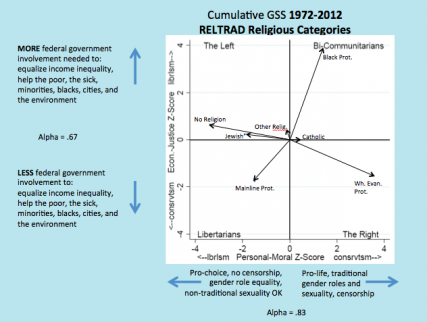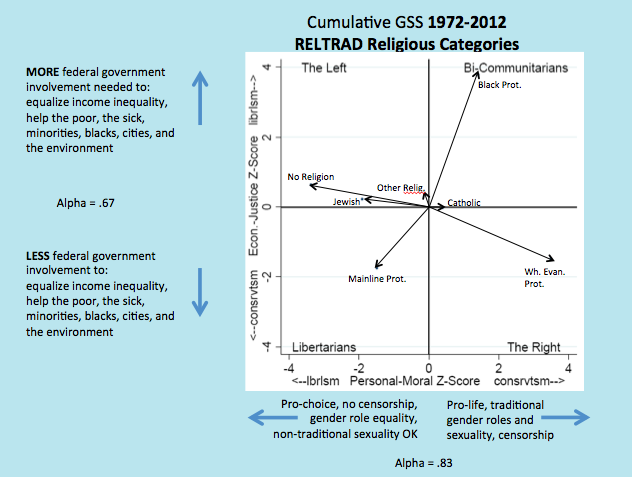
Positions of persons in religious traditions on matters of personal morality and economic justice.
Source: Dan Olson and Ben Pratt’s 2014 SSSR presentation “Visualizing Changes in Dimensions of Cultural, Religious, and Political Tension Among the American Public 1972-2012.”
It’s reassuring when researchers approach the same question in different ways and come up with the same answer. It suggests that we might actually be learning something.
A couple of months ago, I put together a graphic showing the political positions of American churches and religions. My analysis was based on Pew’s 2007 Religious Landscape survey, which included more than 35,000 people.
My work received a lot of attention. One of the most fascinating pieces of the graph was the position of people who belonged mainline churches. Despite the liberal positions of clergy and church leaders, mainline Protestants are some of the most conservative on economic issues. Mainline Protestants favored a smaller government that provided fewer services. The mainline churches could be described as “libertarian” because they also favored a government that stayed out of policies protecting morality.
Evangelicals held about the same position on economics, but they were much more conservative on the role of government in protecting traditional morality. Black Protestants, too, were conservative on social issues. They were much more supportive a larger government on economics.
Dan Olson and Ben Pratt of Purdue University crunched a different set of numbers but came up with remarkably similar results. They presented some of their results at the Society for the Scientific Study of Religion meetings last week.
Olson and Pratt used the General Social Surveys (GSS) from 1972 through 2012. The GSS is the gold standard for sociological surveys. It included a bunch of questions on social issues and economic issues, which made it a better measure than the rather blunt measure I used. Olson and Pratt were able to score individuals on two dimensions:
- Personal morality including abortion, censorship, gender roles, and sexuality.
- Economic justice, particularly the role of the federal government in dealing with income inequality, poverty, health, urban issues, the environment, and problems facing blacks and other minorities.
Using these measures, Olson and Pratt then calculated the average positions of people in various religious traditions. (Note: If you want to compare the two graphs, you’ll need to rotate theirs counterclockwise so that the personal-moral is the y-axis)
The result is a replication of what I found using Pew’s data.
- Mainline Protestants: Libertarians who want government out of our wallets and our bedrooms.
- Evangelical Protestants: “The Right” who want a smaller government in the market and but want government involved in issues of personal morality.
- Black Protestants: “Bi-Communitarians” who want a strong government presence in both economics and personal morality
- No religion: Want government out of the bedroom, but they’re split on the role of government on economic issues. On balance they tend to be more in the “The Left” than in the libertarian camp.
- Catholics: Just as in my graph, they’re in the dead center on both dimensions. (For more on Catholics see this graph)
Different surveys. Different measures. Same basic results.
I think we may have something here.
You can read earlier analysis by Dan Olson in this book chapter.
Don’t miss any more posts from the Corner of Church & State. Click the red subscribe button in the right hand column. Follow @TobinGrant on Twitter and on the Corner of Church & State Facebook page.





